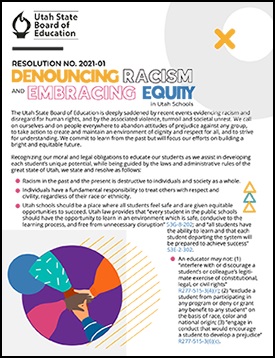Educational Equity
Overview
The Utah State Board of Education (USBE) leads by creating equitable conditions for student success: advocating for necessary resources, developing policy, and providing effective oversight and support.
Acknowledging that all students are capable of learning, educational equity is the distribution of resources to provide equal opportunities based upon the needs of each individual student. Equitable resources include funding, programs, policies, initiatives and supports that recognize each student’s unique background and school context to guarantee that all students have access to high-quality education.
Educational Equity provides K-12 public school system support to families, districts, and charter schools regarding issues surrounding civil right compliance in accordance with the United States Department of Education and the Office for Civil Rights (OCR) regulations, which prohibits discrimination of students in any program or activity receiving federal financial assistance based on:
- disability (Section 504 of the Rehabilitation Act of 1973)
- sex (Title IX)
- race, color, or national origin (Title VI)
Is Your Child Experiencing Discrimination in School?
If you believe that your child is experiencing discrimination, the USBE recommends the following procedures to seek resolution:
- Try to resolve your differences at the teacher or school level. Set up a meeting to discuss your concerns.
- If unable to resolve at the school level, set up a meeting with your District Coordinator
and inquire about their grievance processes. Federal law does not require LEAs to
assign a Title VI Coordinator. Contact your district’s educational equity or student
services department for more information about filing a grievance related to Title
VI.
- If resolution is unsuccessful at the district level, call the USBE Student and Family Rights Specialist at (801) 538-7828 for guidance. The USBE is not an authoritative body over civil rights compliance. Resolutions happen at the district/school level, via due process hearings, or through the United States Department of Education OCR. The USBE can provide technical assistance to citizens, educators, students, and other stakeholders, answer questions, and provide resources to assist in the resolution process.
- A complaint may be filed with the United States Department of Education OCR within 180 days after the violation has occurred using the OCR Complaint Process or contact OCR in Denver at (303) 844-5695 or TTY: (303) 844-3417.
Regulation
Title 34 C.F.R. 104.36: Procedural Safeguards
United States Department of Education
Regulates due process hearings or under Section 504/Americans with Disabilities Act (ADA). These processes resolve differences involving the education of Section 504/ADA and qualified students with disabilities when such differences cannot be resolved by means of a less formal procedure.
Note: A school may not retaliate against any person who has made a complaint, or who has testified, assisted, or participated in any manner in an investigation or proceeding.

